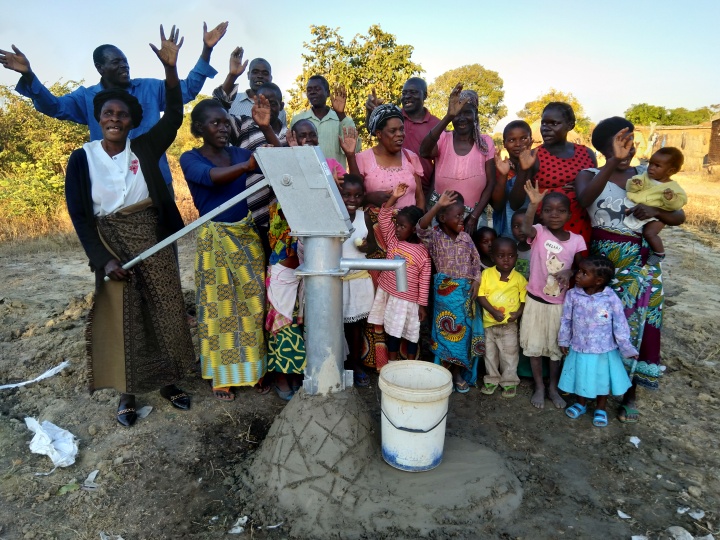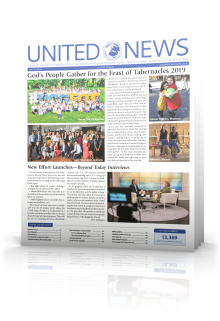LifeNets International: 20 Years of Service

These and many more highly targeted services represent typical activities of LifeNets International over the past 20 years. As a result of its unique focus—relieving suffering and generating hope through opportunities to become self-sufficient—the organization has helped thousands of people, including many in the United Church of God.
Through LifeNets support and scholarships, needy people—including United Church of God members in remote areas—have become medical doctors, dentists, nurses and nurse practitioners, teachers, computer programmers, accountants, bankers and more. A number of impoverished communities have received LifeNets funds to drill boreholes to supply much-needed water. Others have purchased livestock and critical seed for planting. Given this track record, many have asked: “How did LifeNets come about?” The answer lies in people simply trying to find a way to help children and other people in need—that was the driving force that led to the creation of LifeNets two decades ago. What is today an organized outreach to people to Eastern Europe, Africa, Latin America and Asia—all purposed to relieve suffering, create hope and develop opportunities—started with very modest beginnings.
Helping victims of the Chernobyl disaster
Here’s how it began: in 1996, Victor and Beverly Kubik were in England for the Feast of Tabernacles. During a dinner that included Maurice Frohn, a retired pediatric surgeon, Dr. Frohn related disturbing reports about children suffering from radiation-induced illnesses from the Chernobyl nuclear disaster in Ukraine. Dr. Frohn asked Mr. Kubik, who is fluent in Ukrainian and Russian, to accompany him on an investigative trip.
What they found was horrifying. Both men returned from Ukraine determined to find a way to help. Dr. Frohn organized relief efforts in England, while Mr. Kubik returned to the United States. Through family and other connections, the Kubiks found ways to collect and ship tons of much-needed supplies to the afflicted children of Chernobyl. Volunteers, including local members of the United Church of God, pitched in to help. As people heard about these relief efforts, more wanted to help, even contribute funds. In November of 1999, Mr. Kubik set up LifeNets International as a formal non-profit organization, taking a name that reflected how the organization provided a “safety net” that relieved suffering and sustained life.
LifeNets expands operations
The new organization quickly expanded. Over time, more than 160 tons of supplies were solicited, assembled and shipped by volunteers—all for free through U.S. federal government programs. Shipments of supplies expanded from Ukraine to include shipments to Malawi, one of the poorest countries in the world. Bev and Vic Kubik were able to secure the donation or purchase (at very lost cost) of medical supplies and equipment.
Since the shipments went to areas that were often impoverished and governed by corrupt officials, the Kubiks learned how to get supplies through complex customs without paying bribes.
Network grows in international areas
The influence and impact of LifeNets expanded further with the first U.S. visit of Dr. Vasyl Pasichnyk, director of the Ukrainian Revival Centre, in 1999. LifeNets arranged for several visits to the Mayo Clinic and other hospitals that included interviews with area media in Indiana and Minnesota. A private visit with then-Indiana First Lady Judy O’Bannon resulted in LifeNet’s network being greatly expanded, as Mrs. Bannon, wife of then-Indiana Gov. Frank O’Bannon, personally invited Mr. Kubik to go on an official fact-finding tour of Russia with her and several business, academic and civic leaders. That visit led to Mr. Kubik’s subsequent longtime involvement with Rotary International, which later provided grants and other support for vehicles and programs in international areas.
Other requests for humanitarian help poured in, and LifeNets programs expanded to Zambia in Africa, then to Latin America. More people started donating funds, and a number of major corporations like Bank of America, Shell Oil, and Microsoft started gift-matching the modest donations. LifeNets was incorporated as a humanitarian organization so it could appropriately operate in global areas where a religious organization could be viewed with suspicion or outright banned.
As funds became available, LifeNets expanded its scholarships program in Africa, Eastern Europe, Latin America and Asia. LifeNets began supporting and sending volunteers to summer camps and other programs, including Sabbatarian groups. In addition to funding programs directly, LifeNets also organizes a considerable amount of in-kind donations, including specialty wheelchairs and other medical equipment. The LifeNets wheelchair program was even featured in USA Today and Real Simple magazine.
A unique focus
Many humanitarian organizations provide funding, so LifeNets took a unique focus, which remains today. LifeNets strives to both relieve suffering and at the same time, create the means where local people can become more self-sufficient by learning new skills or using resources and tools (including seed and livestock) provided by LifeNets to build up lives. While consistently looking to God for direction and opportunity, LifeNets focuses on these principles of operations:
• Meeting humanitarian needs to relieve suffering.
• Generating hope through opportunities to become self-sufficient.
• Serving on the basis of mutual respect, honor and dignity with both recipients of aid and with donors.
• Delivering services through local leaders whom we know and trust.
• Being culturally sensitive in the type and amount of aid we deliver.
• Leveraging donations where possible by partnering with organizations who provide products at reduced costs.
• Using wherever possible governmental services (such as the U.S. State and Defense Departments) to defray costs of shipping supplies.
• Creating a circle of ongoing benefits, including creating the capacity for recipients to pass on aid, training, and services to others, teaching and emphasizing the ability to become living examples of “Passing on the Gift” to their communities.
Going forward
Today, LifeNets continues its unique focus, often working in concert with the Good Works program of the United Church of God. In fact, a majority of LifeNets’ outreach supports United Church of God people and programs. A formal LifeNets affiliate organization has been established in Australia. The LifeNets board includes a CPA and other financial professionals, and as a certified 501 (c) (3) organization, LifeNets carefully adheres to standard accounting and reporting practices.
We want to thank all our brethren who have managed the projects locally. This monitoring has ensured their success and sustainability.


